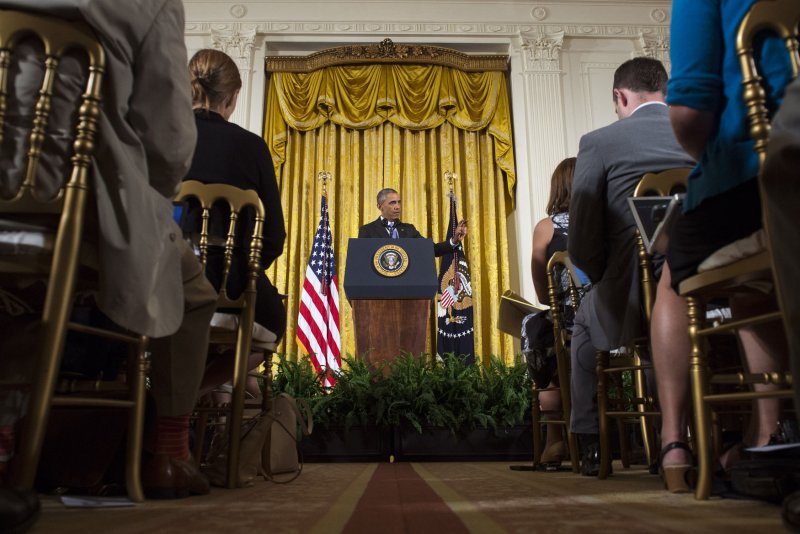President Barack Obama holds a press conference on July 15, 2015, in which he defended the landmark nuclear agreement reached with Iran. Thursday, the White House rejected claims in a report by a security watchdog that accused U.S. officials of letting Tehran slide on a few of the requirements outlined in the agreement in order to get it implemented on time in January. File Photo by Kevin Dietsch/UPI |
License Photo
WASHINGTON, Sept. 1 (UPI) -- President Barack Obama's administration on Thursday flatly rejected claims by a science and security watchdog that U.S. officials have let Iran slide on a few requirements listed in last year's landmark nuclear deal.
Earlier Thursday, the nonprofit Institute for Science and International Security published a report that accused a U.S. special supervisory commission of letting Tehran off the hook on a few mandates in order to get the agreement, called the Joint Comprehensive Plan of Action, implemented this year.
Iran was tasked with numerous reforms by U.S. and five other Western powers in July 2015 to neutralize Tehran's nuclear program in exchange for the thawing of several economic sanctions that crippled the Middle Eastern nation for decades.
"The JCPOA placed detailed limitations on facets of Iran's nuclear program that needed to be met by Implementation Day, which took place on January 16, 2016," the watchdog's report stated. "Most of the conditions were met by Iran. However, we have learned that some nuclear stocks and facilities were not in accordance with JCPOA limits on Implementation Day, but in anticipation the Joint Commission had earlier and secretly exempted them from the JCPOA limits."
"In one case, a loophole, involved the low enriched uranium cap ... and the number of large hot cells allowed to remain in Iran," it continued. "One senior knowledgeable official stated that if the Joint Commission had not acted to create these exemptions, some of Iran's nuclear facilities would not have been in compliance with the [deal] by Implementation Day."
Video: Fox Business
The White House, though, quickly dismissed the report Thursday afternoon.
"The argument that somehow this agreement was implemented before Iran came into compliance is just not true," spokesman Josh Earnest said during a press briefing.
Earnest added that he had not yet read the entire report, but rejected the idea that Iran failed in any way to meet the terms of the agreement.
"Right now as we speak, Iran is in compliance with the agreement. That's not my opinion, that's not rhetoric, that's not conjecture. That is a fact that is verified by international experts," he said.
"There's been no moving of the goalposts, as it were," State Department spokesman John Kirby added in a briefing Thursday. "There's been no loosening of the commitments and Iran has not and will not be allowed to exceed the limits that are spelled out in the JCPOA."
The report, which did not identify its sources, also suggests that in the interest of his foreign policy legacy, Obama has been too secretive about the agreement and gave too many concessions to Iran to keep the pact from dying.
The news is a minor victory for opponents of the deal who criticized the Obama administration for many terms of the agreement, which put Tehran's nuclear program on a restricted and supervised track for 10 years.
Institute for Science and International Security report on Iran exemptions















